Experts call for a strong policy framework to promote electric vehicles

ISLAMABAD, MAY 27 /DNA/ – Pakistan needs to strengthen its policy framework to promote electric vehicles, which are not only environment-friendly but also it will reduce the country’s dependency on fossil fuels, experts say at a webinar.
The webinar on “Market preparedness and Policy Support for Electric Vehicles (EVs) in Pakistan” was organized by Sustainable Development Policy Institute (SDPI) here.
During his keynote address, Prof. Dr Naveed Arshad, Lahore University of Management Sciences said Electric Vehicle Policy lack ownership in Pakistan. Besides, he said, the involvement of a single ministry for policy formulation and implementation tracking is not enough. He suggested forming a high-level body on top under Planning Commission, Board of Investment, or parliament itself for the key decision-making. He further suggested that the government must provide a least resistant path to critical mass of EVs, convert public vehicles to Electric ones, invest in indigenous research, provide new financial models, and ensure minimum quality and safety of the vehicles.
Secretary, Federal Board of Revenue (FBR), Mr Sabir Jamil, said that the government of Pakistan is offering several taxation and incentive schemes for electric vehicles. Moreover, he added, to promote such environment-friendly vehicles, support financing mechanisms are being offered to develop charging infrastructure.
Former Director-General, Environment and Climate Change, Ministry of Climate Change (MoCC), Mr Muhammad Irfan Tariq, asserted that climate change is the most critical driver of Electric Vehicle Market growth across the globe. The MoCC brought EV policy as a strong agenda item as it makes a perfect economic and environmental sense for the country’s climate ambitions and targets, he added.
Dr Hina Aslam, Research Fellow and Head, Energy and China Study Centre, SDPI, earlier informed the participants that the transport sector of Pakistan is responsible for approximately 30% of total emissions from the energy sector. She argued that a transition towards electric vehicles can reduce Pakistan’s dependency on petroleum products.
Dr Tanvir Ahmad, Project Manager, Energy, United Nations High Commissioner for Refugees (UNHCR), said that the major challenge for EV market growth in Pakistan is the lack of demand due to high initial cost associated with the vehicles and the battery components.
Mr Ahmed Sajeel, Regional General Manager-North, Dewan Motors (BMW Group), was of the view that our EV Policy is an off-and-on policy with no real custodian.
Mr Khalil Raza, Energy Efficiency Consultant, The World Bank Group, emphasized the need to develop a robust institutional framework that can provide market support.
Ms Komal Kareer, Analyst, Bloomberg NEF. opined that before mass conversion schemes, the policies in Pakistan must initially target the electrification of 2-wheelers, 3-wheelers, and the public transport.
Ms Nupur Shah, Founder, Sustain Bhoomi Renewable & EV Consultancy, highlighted the importance of developing a ‘Single Window Communication’ model that eases the registration process.
Related News

Aurangzeb chairs meeting on regional energy situation
ISLAMABAD, MAR 4 /DNA/ – The Committee to Monitor Petrol Prices in the Wake ofRead More

Ambassador Varga highlights strong potential for bilateral trade growth
ISLAMABAD, MAR 4 /DNA/ – Ambassador of Hungary Dr. Zoltan Varga has said that HungaryRead More


Comments are Closed